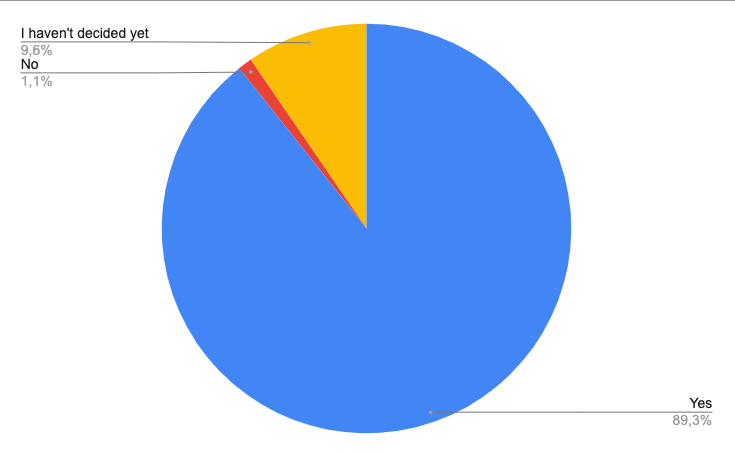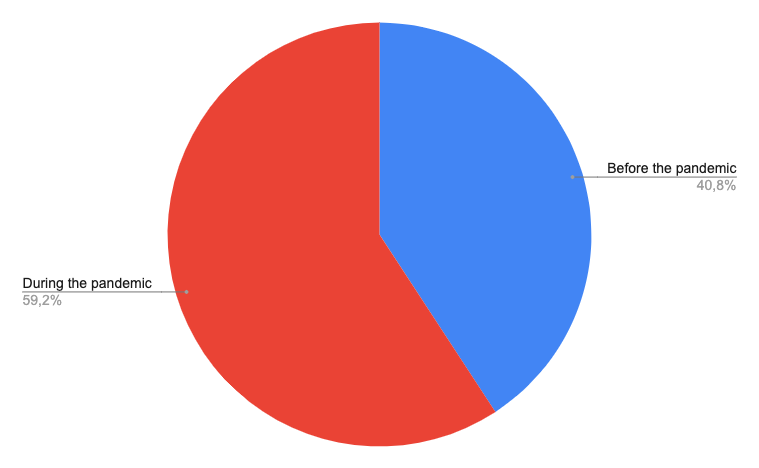Thanks for subscribing!
Check your inbox and confirm your email address to receive offers and updates on our Italian courses.
Written by: Jakob Straub
Published on: Aug 20th, 2021
Not just a trend: 9 out of 10 language learners want to keep studying after the pandemic. The impact of Covid-19 on language learning is profound and permanent. The online language learning platform Lingoda surveyed over 1,500 students and found that nearly all of them want to keep studying even after the pandemic. Almost 60% of participants started learning a language during the health crisis, with the extra free time as a major contributing factor.
Millennials were the most numerous age group to respond and viewed learning a language as a way to improve their lives. (Learn more about our methodology.)
Read on about the lasting impact of the pandemic on language learning, discover what motivates millennials and younger students to study and get tips on how to stay motivated to learn a language.
| Nearly 60% of survey respondents started learning a language during the pandemic, and 90% plan to stick with it after restrictions lift. |
| Millennials made up more than 50% of participants and Generation Z more than 20%. Especially for these younger students, language learning as a way to improve their lives. |
| Extra free time was the biggest contributing factor for 17% of participants who started learning a language during the pandemic. |
| The pandemic has had a profound and permanent impact on language learning. Nearly 60% of students started during the pandemic, while 40% started before. |
| Main motivating factors for students were: feeling more confident in communication (14%), integrating into a new country (14%), and learning as a hobby (13%). |
Covid-19 has pushed language learners to commit to learning a new language, and it's more than a trend that will end with the pandemic. Nearly 90% of survey respondents said they will keep up their efforts beyond the end of the health crisis and only 1% said they would stop. The remainder hadn't decided yet.

The pandemic didn’t stop existing learners from continuing. A full 41% of survey takers said the pandemic didn’t change anything about the way they studied language. Meanwhile, other survey respondents said they actually boosted their language learning during the pandemic by challenging themselves to watch shows in the original language without subtitles, communicating in their target language or reading foreign language material.
| The pandemic didn't change anything | 41% |
| Starting to watch TV series/shows in the original language without subtitles | 17% |
| Starting to communicate/talk to people in that language | 14% |
| Starting to read books and/or news/articles in the original language | 12% |
| Starting to write/produce texts in the original language | 5% |
| Discovering online classes due to unavailability of offline classes | 4% |
| Other | 6% |
About 17% of participants used the extra free time due to Covid-19 to start learning a new language. Nearly 60% of Lingoda students polled started learning during the pandemic, while the remaining 40% started before the onset, 1.5 years ago.
Top 5 motivators for learners who started during the pandemic

All of these findings are in line with Lingoda’s view of the changes in the language learning sector: the health-related lockdowns have introduced more learners to online classes as a format that fits their needs and circumstances. They value the flexibility and convenience of the online format, which will ensure they can keep learning regardless of how their post-pandemic schedule and work-life will look like.
The Lingoda student survey represents younger students in particular:
There are minor differences in demographic distribution across markets, for example, millennials are more numerous in European markets such as France and Germany, while the U.S. has more users in the higher age groups, relatively speaking.
While 40% of Lingoda students are in the beginning stages of their career, improving their job situation or advancing their career are not among the top three motivational factors for them. Only 29% of students responded that they were learning "to apply for a new job". And yet, communication, learning about cultures and easier travel experiences ranked highest among motivations:
Looking at the single main motivational factors for learning a new language, "to advance my career" was only the top fourth response with 12% giving that answer while feeling more confident in communication ranked first here as well. The top three main motivators selected by students are:
Looking at those students who started learning a new language during the pandemic, the additional free time available was their main motivational factor, but other responses here offer further insight. Learning something in general, mental stimulation or creating a daily routine were also important to students.
While open to interpretation, this data seems to be in line with larger trends, especially among younger people, to rethink their work-life balance. The pandemic and confinement measures have seen a surge in the discussion of issues such as home office and remote work policies, the benefits of shorter workweeks and prioritizing mental health, self-care and personal well-being over work output measured in productivity or efficiency alone.
The OECD views adapting workplace policies to promote mental health amidst the COVID‑19 crisis and beyond as crucial. It remains to be seen whether a true systemic shift around our work culture will take place, but it seems safe to assume that just like in the language learning sector, changes are here to stay in the way we work due to the pandemic.
According to the European Council's Eurostat survey, English, French, German and Spanish are the top four languages most commonly studied by upper secondary students in the EU, which corresponds with other global and international learning preferences.
With their offering of online language courses, Lingoda enables students to study four of the top 10 languages to learn in 2021.
While we hopefully won’t have to wear Covid-19 masks forever, the question remains whether positive pandemic habits will stick around. We’re likely to keep up a behavior if we can see and feel how it’s improving our quality of life. This overlaps with the motivational factors Lingoda students have given, which makes it seem likely that the dedication of nine out of ten learners to continue their online language classes beyond the pandemic will bear out.
Based on the survey results, Lingoda offers a few practical tips to students to build up and keep the habit of language learning.
The flexibility and convenience of online classes are core values for Lingoda students. When trying to build a language learning habit, sessions at regular intervals are more helpful than long sessions of “cramming” spaced further apart.
Use the flexible online classes Lingoda offers to your advantage and make use of free time slots in your existing schedule rather than trying to bend your work hours and other obligations around a fixed time for studying. You’ll find it easier to achieve weekly learning streaks, which are so important for building a strong habit.
Rewards are helpful in building a language learning habit. Your long-term goal often coincides with your initial motivation, whether that is advancing your career through language skills, being able to communicate with confidence or integrate into a new country, or as a hobby.
Lingoda online classes help you stay the course in achieving that goal by tracking your progress. They also motivate you session by session through immediate rewards in the form of feedback from professional language teachers and other students in the virtual classroom.
Holding yourself accountable is key in sticking with a language learning habit. Some learners do this in the form of an accountability partner, who can also be a tandem partner in a language exchange. With the Sprint and Marathon, Lingoda offers two different options to commit, each with a double incentive: you give yourself a timeframe and the possibility of earning cashback.
While nearly one third of Lingoda students choose a monthly subscription with two to three classes per week, 50% commit to a variant of the language Sprint or Marathon. Accountability works: almost 45% of students report they plan on staying for more than a year with Lingoda.
Lingoda collected quantitative data for this study in a 15-minute online survey among students on the platform. All participants had a currently active Lingoda account and could opt into the study. Participants answered questions in regard to demographics, personality, their learning behaviour and motivation, the influence of the pandemic on their studies, their news and social media habits as well as their perception of Lingoda and feedback on the product. Of the overall 1,526 participants, 374 came from Germany, 262 from the United States and 98 from France.